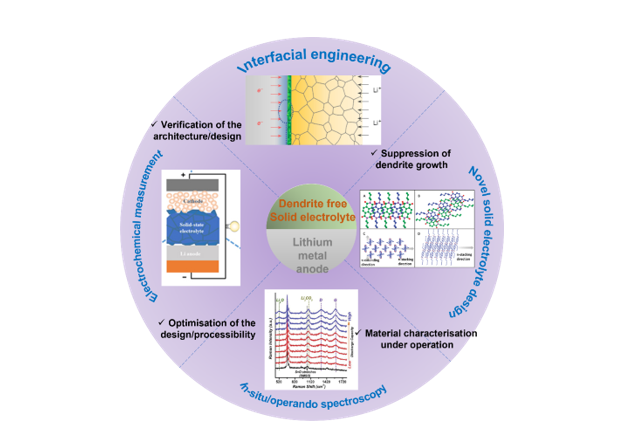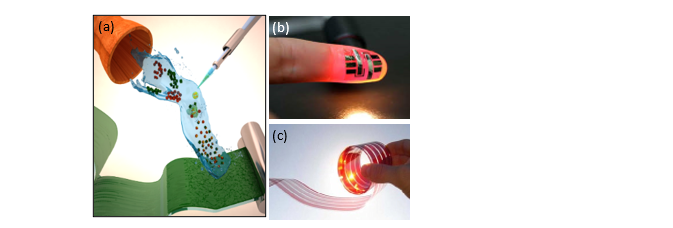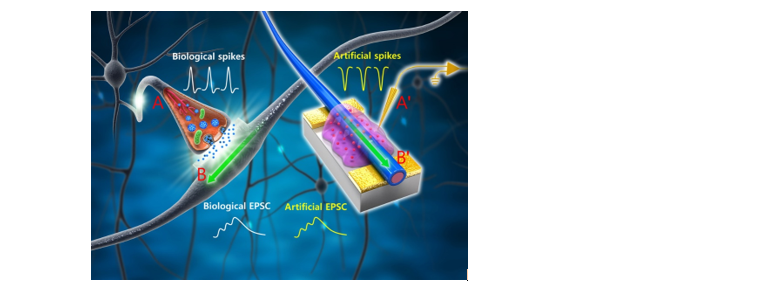Available PhD Projects
MRes in Soft Electronic Materials: We are now accepting applications for October 2026 entry!
The 12-month, 90-ECTS, Bologna-compliant, MRes in Soft Electronic Materials aims to provide a thorough foundation in the science and application of soft electronic materials.
Visit the Centre for Processable Electronics website for more details.
PhD projects are available for 2026 entry
The exciting projects on offer with Prof Ji-Seon Kim in 2026 are detailed below! Please e-mail Ji-Seon Kim for more information.
| JSK Project 1 (Fully funded): Interface engineering for high performance energy storage applications |
|---|
|
Academic supervisor: Prof Ji-Seon Kim (Imperial Physics)
Industrial supervisor: Dr Juyeon Park (SLB, Schlumberger Cambridge Research Limited) The energy storage device market is currently dominated by battery technology which is aligned with global net zero emission ambitions. High performance of the battery requires the optimisation of important parameters such as energy, power, cycle life, cost, and safety, which are strongly linked to materials chemistry, interfacial engineering, and device physics challenges. Although lithium metal anode has attracted significant attention for solid state battery applications owing to its high theoretical specific capacity, the key issues related to undesirable lithium dendrite growth during operation still hinder its full potential for commercialisation. In this project, we aim to address these important interface issues of energy storage devices. We will elucidate fundamental understanding of the interfacial properties by applying innovative interface engineering and by developing in-situ electrochemical and energetics spectroscopic techniques.
|
|
JSK Project 2: Single-Component Organic Photovoltaics and Photodetectors |
|---|
|
Organic photovoltaics (OPVs) and photodetectors (OPDs) have attracted great interest in both the research and commercial market due to their applicability to low-weight and flexible devices, adjustable detection range by molecular design, non-toxic material-based devices, and the optimum absorption properties of organic semiconductors. In general, bulk-heterojunctions (BHJs) formed by blending two or more organic semiconductors together have been widely utilized as the photoactive layer in OPV/OPD devices to provide the energetic offset for efficient exciton dissociation. Although BHJ devices produce excellent device performance due to the large interfacial areas between different materials, in terms of commercialization, the use of two or more different materials as the photoactive layer has many limitations. They include complicated optimization procedures, low reproducibility of the film quality, and unavoidable broadband absorption due to multi-component blend systems. We have recently demonstrated that these limitations could be overcome by using a single-component organic photoactive layer [1, 2]. In this project, we will utilise newly developed non-fullerene acceptors (NFAs) [3] as a single-component photoactive layer to fabricate high performance OPV/OPD devices. Furthermore, we will elucidate the molecular origins of electronic states and interfacial energetics that are key to the OPV/OPD photophysical processes such as charge generation, recombination, and extraction. In particular, we will identify the impact of the molecular structures (e.g., planar vs twisted) and molecular properties (e.g., quadrupole moment, intermolecular interaction, and packing) of NFAs on these processes. [1] Park et al., The State-of-the-Art Solution-Processed Single Component Organic Photodetectors Achieved by Strong Quenching of Intermolecular Emissive State and High Quadrupole Moment in Non-Fullerene Acceptors, Advanced Materials, 2306655 (2023), DOI: 10.1002/adma.202306655 [2] Luke et al., Key molecular perspectives for high stability in organic photovoltaics, Nature Reviews Materials, 8, 839–852 (2023), DOI: 10.1038/s41578-023-00606-5 [3] Fu et al., Molecular orientation-dependent energetic shifts in solution-processed non-fullerene acceptors and their impact on organic photovoltaic performance, Nature Communications 14, 1870 (2023). DOI: 10.1038/s41467-023-37234-0
Schematics of printing flexible OPV/OPD devices (a), printed flexible OPD (b) and OPV modules (c). |
|
JSK Project 3: Developing Organic Synaptic Transistors for Neuromorphic Circuits |
|---|
| Synaptic transistors provide the parallel storage and processing of data, ideal for running artificial intelligence algorithms when implemented into neuromorphic circuits compared to the von Neumann architectures used in current computer systems. Organic semiconductor devices such as organic transistors and chemiresistors, which benefit from solution processability, have been investigated regarding the impacts of the molecular design on device performance and the application of such devices as biosensors [1-4]. However, most of these devices implement liquid electrolytes, restricting independent gating, reducing operation speed and decreasing feasibility for miniaturised integrated circuit fabrication. Such limitations can be overcome by implementing an all-solid-state architecture. In this project, we will explore this exciting possibility by fabricating, optimising and characterising organic synaptic transistors with a range of organic channel materials. In particular, we will develop accumulation-mode transistors to utilise their low-power operation. We will use various device fabrication methods, electrical characterisation regimes and optoelectronic and structural characterisation techniques to identify the electronic and ionic charge transport mechanisms which provide short- and long- term plasticity effects in OSTs. As such, the synaptic plasticity effects of OSTs will be measured and the key mechanisms of synaptic behaviour at the molecular level of organic semiconductors and their interactions with ions will be elucidated. With efficacious OSTs presented, the devices will be fabricated into basic neuromorphic circuits that demonstrate associative/Pavlovian learning.
[1] Tyrrell, J. E., Boutelle, M. G., Campbell, A. J., Measurement of Electrophysiological Signals In Vitro Using High-Performance Organic Electrochemical Transistors. Adv. Funct. Mater. 2021, 31, 2007086. [2] Tyrrell, J. E., Petkos, K., Drakakis, E. M., Boutelle, M. G., Campbell, A. J., Organic Electrochemical Transistor Common-Source Amplifier for Electrophysiological Measurements. Adv. Funct. Mater. 2021, 31, 2103385. [3] Tan, E., Kim, J., Stewart, K., Pitsalidis, C., Kwon, S., Siemons, N., Kim, J., Jiang, Y., Frost, J. M., Pearce, D., Tyrrell, J. E., Nelson, J., Owens, R. M., Kim, Y.-H., Kim, J.-S., The Role of Long-Alkyl-Group Spacers in Glycolated Copolymers for High-Performance Organic Electrochemical Transistors. Adv. Mater. 2022, 34, 2202574. [4] Stewart, K., Pagano, K., Tan, E., Daboczi, M., Rimmele, M., Luke, J., Eslava, S., Kim, J.-S., Understanding Effects of Alkyl Side-Chain Density on Polaron Formation Via Electrochemical Doping in Thiophene Polymers. Adv. Mater. 2023, 2211184. (Source: https://www.science.org/doi/10.1126/sciadv.1501326) |
| JSK Project 4: 2D/3D Perovskites for Efficient Solar Cells |
|---|
|
Recently, 2-dimensional (2D)/3D perovskite solar cells have attracted great research interest due to their potential to overcome the single-junction Shockley–Queisser theoretical efficiency limit, as well as to reduce the high trap state density and instability of 3D perovskite solar cells. In this project, we will first control the energy levels of perovskite layers via their dimensionality control (3D and 2D/3D) with varying composition and stoichiometry (applying different cations and anions in the 2D perovskite). We will then identify the nature of trap states in these dimensionality-controlled perovskite layers. The energy levels together with the trap state distribution will be investigated by using ambient photoemission spectroscopy (APS), which will be complemented by surface photovoltage (SPV) measurements to investigate the impact of cascaded energy levels and trap states on photogenerated charge carriers. Finally, the impact of dimensionalitycontrolled perovskites and their trap states on solar cell performance (efficiency and stability) will be investigated. The advanced spectroscopy techniques such as APS and SPV are relatively new and our expertise in this area will be crucial for the success of the project. The project will also include simulation of APS signals and/or one-dimensional drift-diffusion modelling of device performance and surface photovoltage.
[1] Henderson C, et. al., Charge transfer complex formation between organic interlayers drives light-soaking in large area perovskite solar cells, Energy and Environmental Science (2023), DOI: https://doi.org/10.1039/d3ee02571c [2] Chin, Y. -C., et al., Suppressing PEDOT:PSS Doping-Induced Interfacial Recombination Loss in Perovskite Solar Cells. ACS ENERGY LETTERS, 7(2), 560-568 (2022). doi:10.1021/acsenergylett.1c02577 |
Undergraduate Projects
Lisa was one of the BSc project students in our group (2019/2020) working on the Photostability of Organic Photovoltaics Based on Non-fullerene Acceptors. We are very pleased to hear her research experience in our group and also congratulate her for the 1st class mark on her project!
UG student research experience in Nanoanalysis group from Lisa Winkler:
“I undertook a project in the nanoanalysis group as part of my bachelor’s project within my physics degree. Overall, it was a great experience. Professor Ji-Seon Kim and her students provided a lot of support and resources in order for me to feel comfortable with the research area, whilst also giving guidance on working and presenting results as a research student. From the beginning, I was able to work on experimental techniques, such as Raman spectroscopy, and was soon put in charge of producing such results myself. It was a steep learning curve, and whilst learning about how to measure and analyse results effectively, I had to grasp some complicated theoretical concepts underpinning the research itself. I learnt a lot in a very short space of time within the group, and I was able to contribute to a novel area of research with very important real world applications”.






